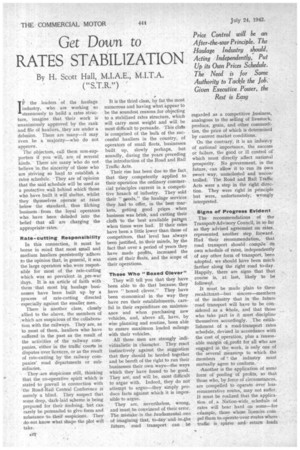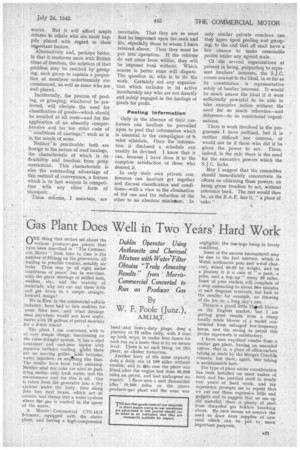Get Down to t.
Page 24

Page 25

If you've noticed an error in this article please click here to report it so we can fix it.
RATES STABILIZATION
By H. Scott Hall, M.I.A.E., M.I.T.A.
Price Control will be an After-the-war Principle. The Haulage Industry should, Acting Independently, Put Up its Own Prices Schedule. The Need is for Some Authority to Tackle the Job.' Given Executive Power, the Rest is Easy
IF the leaders of the haulage . industry, who are working so strenuously to build a rates structure, imagine that their work is unanimously approved by the rank and file of hauliers, they are under a delusion. There are many—it may even be a majority—who do not approve.
The objectors, call them non-supporters if you will, are of several kinds. There are many who do not believe in the sincerity of those who are striving so hard to establish a rates schedule. • They are of opinion that the said schedule will be used as a protective wall behind which those who have built it will shelter, whilst they themselves operate at fate's below the standard, thus filching business . from the loyal operators who have been deluded into the belief • that all are charging . the appropriate-rates.
Rate-cutting Responsibility
In this connection, it must be borne in mind that most small and medium hauliers .persistently -adhere to the opinion that, in general, it was the large operators who were responsible for most of the rate-cutting which was so prevalent, in .pre-war :days. It is an article of faith with them that most big haulage businesses have been built up by a process of rate-cutting directed especially against the smaller men.
There is another class, closely allied to the above, the members of which are suspicious of the collaboration with the railways. They are, as to most of them, hauliers who have suffered in the past as the result of the activities of the railway companies, either in the traffic courts in disputes over licences, or as the result of rate-cutting by the railway companies' road departments or subsidiaries.
They are sirspiciaus still, thinking that the co-operative spirit which is stated to prevail in connection with the Roacl4Zail Central Conference is merely a blind. They suspect that some deep, dark-laid scheme is being prepared for their Undoing, but can rarely be persuaded to give, form and substance to Ileasuspicions. They do-not know what shape the pot will take..
It is the third class, by far the most numerous and having what appear to be the soundest reasons for objecting to a stabilized rates structure, which will carry most weight and will be most difficult to persuade. This clats is comprised of the bulk of the successful hauliers in the country, of operators of small fleets, businesses built up, slowly perhaps, but soundly, during the years preceding the introduction of the Road and Rail Traffic Acts.
Their rise has been due to the fact that they competently applied to their operation the ordinary commercial principles current in a competitive branch of industry. They sold their " goods," the haulage services they had to offer, in the best -markets, getting good prices when business was brisk, and cutting their cloth to the best available pattvn when times were bad. If their rates have been a little lower than those of competitors, that 'level has always been justified, to. their minds, by the fact that over a period of years they have made profits, increased the sizes of their fleets, and the scope of their operations.
Those Who "Boxed Clever"
They will tell you that they have been able to do that because, they have " boxed clever." They have been economical in the way they have run their establishments, careful in their expe-nditure on maintenance and when purchasing new vehicles, and, above all, have, by wise planning and routine, been able to ensure maximum loaded mileage with their vehicles.
All these men are strongly individualistic in character. They react instinctively against the suggestion that they should be herdedtogether and be bereft of the right to run their businesses their own ways—the ways which they have found to be good. They are, and will be, most difficult to argue with. Indeed, they do not attempt to argue—they simply produce facts against which it is impossible to argue.
They are, nevertheless, wrong, and must be convinced of their error. The mistake is the fundamental one of imagining that, to-day and in4he future, road transport can _ be
regarded as a competitive business, analogous to the selling of livestock, produce, grain, and other commodities, the price of which is determined by current market conditions.
On the contrary, it is an industry of national importance, the success or failure, the good or ill control of which must directly affect national prosperity. No government, in the future, can allow it to run its own sweet way, unmolested and uncontrolled. The Road and Rail Traffic Acts were a step in the right direction. They were right in principle but were, unfortunately, wrongly interpreted.
Signs of Progress Evident The recommendations of the Transport Advisory Council, in so far as they advised agreement on rates. represented another step forward. Had 'their recommendation, that road transport should compile' its own schedule of rates, independently of any other form of transport, been adopted, we should have been much farther along the right road to-day. Happily, there are signs that that course is, at last, likely to be followed.
It must be made plain to these recalcitrant—but sincere—members of the industry that in the future road transport will have to be considered as a *hole, and that those who take part in it must discipline themselves accordingly. The establishment of a road-transport rates schedule, devised in accordance with the cost of operation, plus a -reasonable margin of profit for all who are engaged in the work, is only one of the several measures to which the members of *. the industry must mutually agree to conform.
-Another is the application of some form of pooling of profits, so that those who, by force of circumstances, are compelled to operate over lessremunerative routes, may not suffer. It must be realized that the application of. a Nation-wide schedule of rates will bear hard on some—for erample, those whose licence's compel them to operate-.over routes where traffic is sparse and return loads scarce. But it will ,afford ample returns to others who are 'more' happily placed with •regard to these imaportant factors.
Alternatively and, perhaps better, in that it conforms more with British ideas of freedom, the solution of that problem may be reached by grouping, each group to contain a proportion of members unfortunately circumstanced, as well as some who are well placed.
Incidentally, the process of pooling, or grouping, whichever be preferred, will obviate the need for classification of goods—which should be avoided at all costs—and for the application of an absurdly comprehensive and far too strict code of " conditions of carriage," such as is in the minds of some.
Neither ' is practicable; both are foreign to the nature of road haulage, the characteristic of which is its flexibility and freedom from petty restrictions. This characteristic is also the outstanding advantage of this method of conveyance, a feature which is its best weapon in competition with any other form of transport.
These reforms, I maintain, are
inevitable. That they are so must first be impressed upon the rank and file, especially those to whom I have referred above.. Then they must be put into operation. If the refortias do not come from within, they will be imposed from without. Which course is better none will dispute. The question is, who is to do the work. Certainly not any organization which includes in its active membership any who are not directly and solely engaged in the haulage of goods for profit.
Pooling Information
Only in the absence of their .customers can hauliers be prevailed upon to pool that information which is essential to the compilVion of is rates schedule. Once the information is disclosed a schedule can readily be devised. I know that it can, because I have done it to the complete satisfaction of those who
desired it.
In only• their own private conferences can hauliers get together and discuss classification and conditions—with a view to the elimination of the one and the reduction of the other to an absolute minimum. In only similar private conclave can • they agree upon pooling and grouping, to the end that all shall have a fair chance to make reasonable profits Under any agreed scale.
Of the several organizations at present in being, purporting to represent hauliers' interests, the S.J.C. comes nearest to the ideal, in so far as its constitution is representative solely of haulier interests. It would be much nearer the ideal if it were sufficiently powerful to be able to take executive . action without the need for 80 much reference—and deference—to its constituent organizations.
There is work involved in the programme I have outlined, but it is neither difficult nor onerous, or ' would not be if those who did it be given the power to act. There, indeed, is the rub; there is the need 'for the executive powers which the S.J.C. lacks.
May I suggest that the committee should immediately concentrate its efforts on obtaining these powers, on being given freedom to act, without reference back. The rest would• then be, as the R.A.F. has it, "a piece of cake."




















































